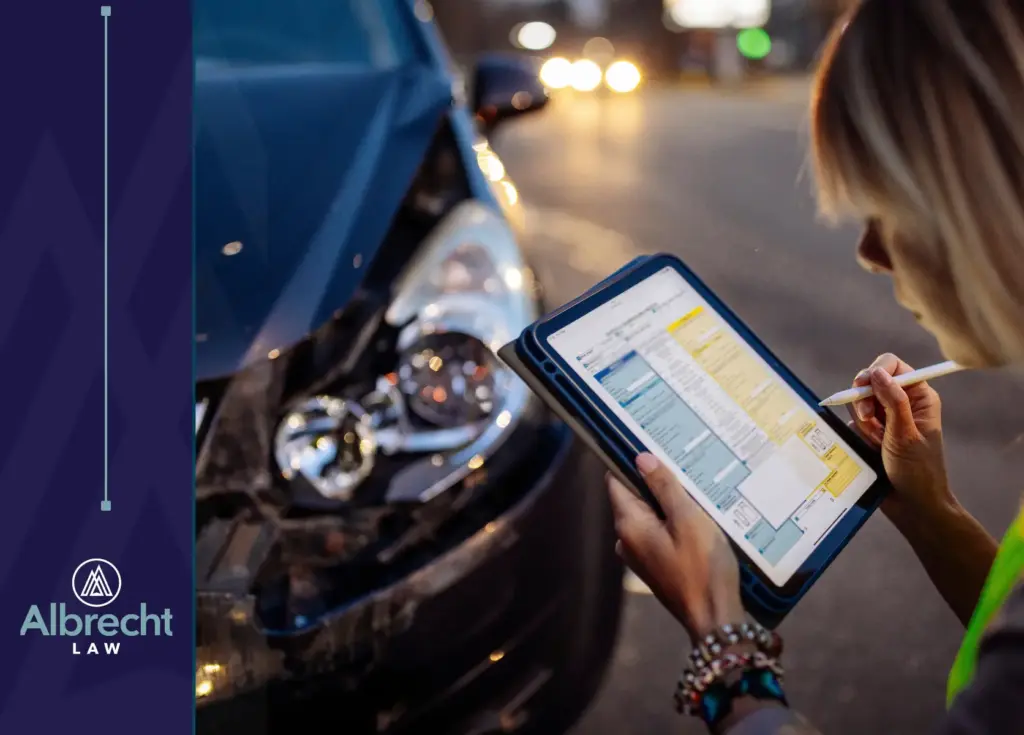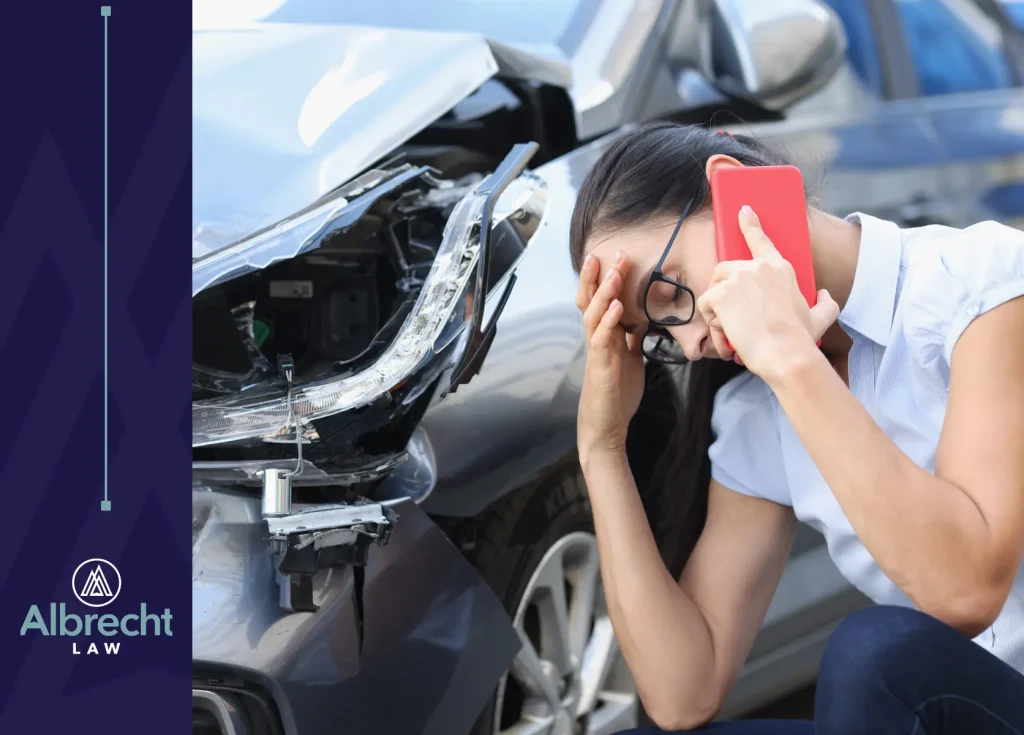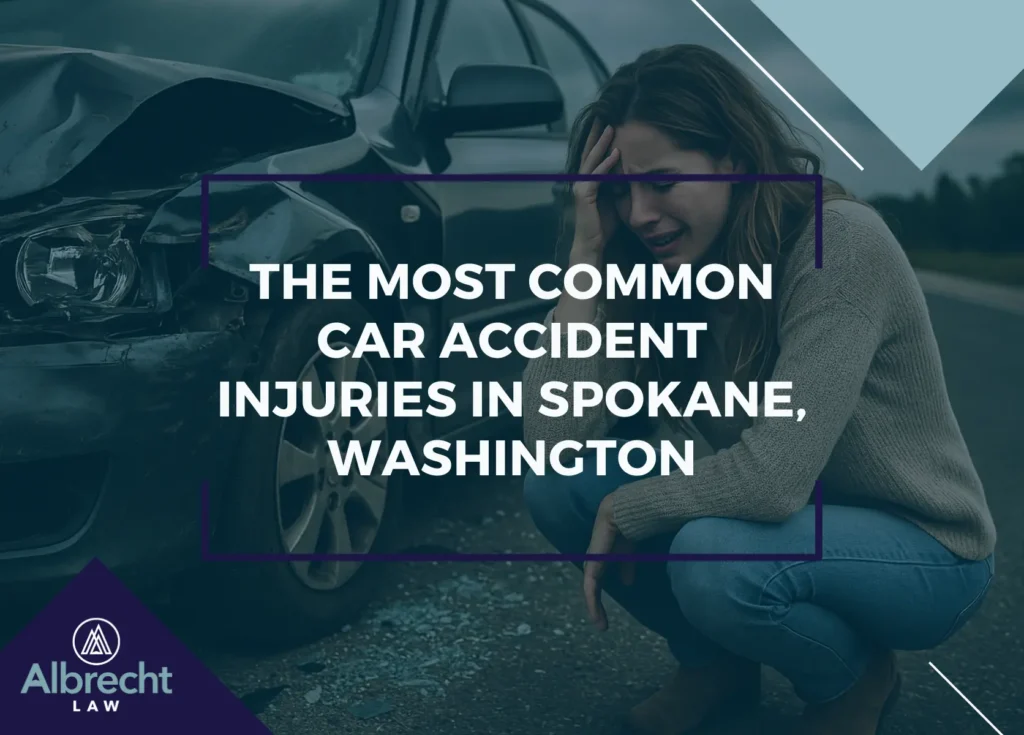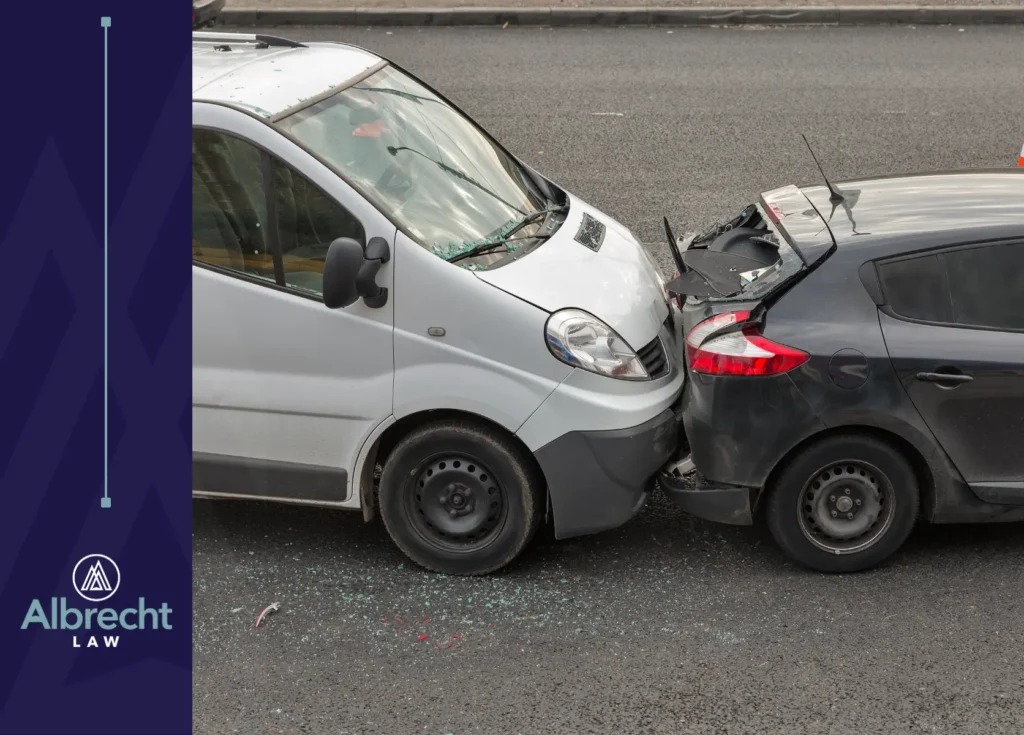What Are the 3 Main Types of Distractions While Driving in Spokane, Washington?
September 15, 2025 – Matt Albrecht
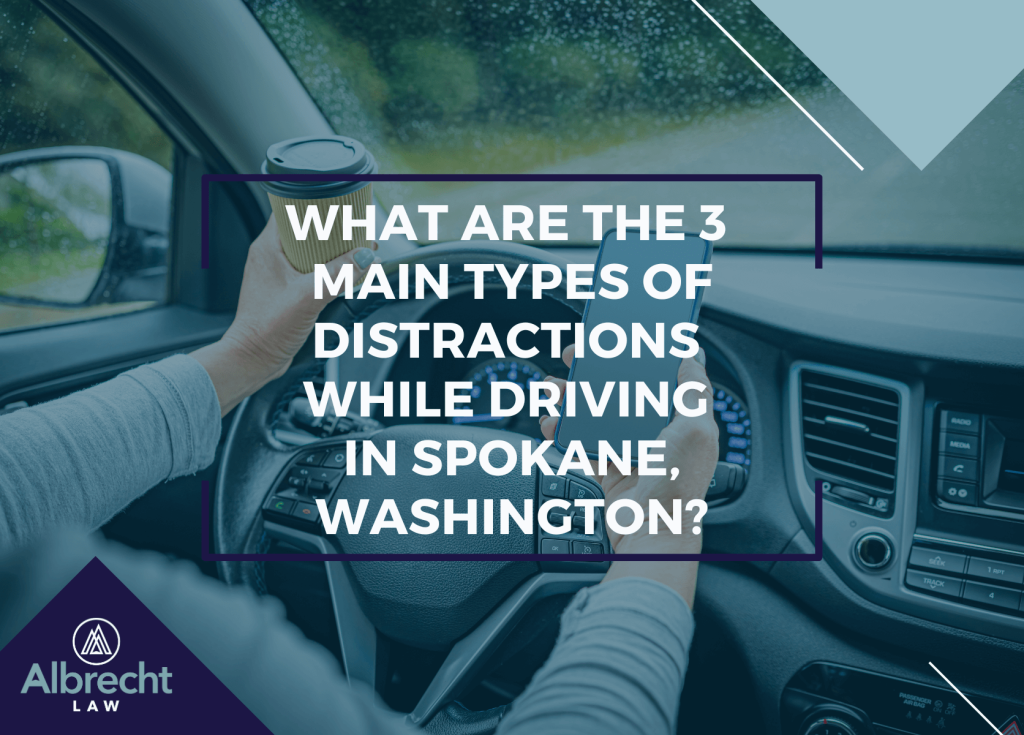
Car accidents in Spokane don’t always come from reckless speeding or dangerous weather. Many happen in an instant when a driver takes their eyes, hands, or mind off the road. A quick glance at a phone on I-90, adjusting the radio at a red light downtown, or checking on a child in the back seat along Sprague Avenue can be all it takes to trigger a serious crash. What follows is often more than just damage to your vehicle. It can mean painful injuries, mounting medical bills, and time away from work.
If you or a family member has been hurt because of someone else’s negligence, you know how quickly life can change. And even for drivers who haven’t faced a crash, it’s important to recognize how distraction turns ordinary routines into real dangers on Spokane’s roads. Distracted driving is one of the leading causes of collisions in Washington state. That is why Washington has taken a firm stance on this issue, with laws designed to prevent these risks before they cause serious harm.
By examining the 3 main types of distractions while driving, you can see why these behaviors are more than small mistakes. They often play a role in Spokane car accident cases.
The Laws on Distracted Driving in Washington State
Washington was the first state in the nation to ban texting while driving in 2007, and lawmakers later expanded the restrictions through the Driving Under the Influence of Electronics Act (RCW 46.61.672). Commonly called the “E-DUI law,” it prohibits nearly all handheld phone use behind the wheel. Unlike some states that allow drivers to use a phone when stopped at a light, Washington’s ban applies even when the vehicle is stationary in traffic.
The statute covers more than just texting or calling. It also makes it illegal to hold a phone while checking social media, taking photos, or watching videos. Limited exceptions apply, such as contacting emergency services, using a mounted GPS with a single touch, or operating a hands-free device.
Violating this law can result in a fine of at least $145 for a first offense and at least $243 for a second offense within five years. Washington also has a separate “dangerously distracted driving” infraction under RCW 46.61.673. This applies when activities such as eating, smoking, grooming, or reading interfere with safe driving and lead to another traffic violation. The statute sets a $30 base penalty, but with court fees the total is typically about $108.
Both types of violations are reported to insurance companies, which can raise your rates. Beyond the traffic consequences, evidence of phone use or distraction may also appear in a civil case to establish negligence.
Statistics on Distracted Driving
The Centers for Disease Control and Prevention (CDC) identifies three main types of distraction: visual, manual, and cognitive. Each plays a major role in making distracted driving so dangerous (CDC).
Federal data shows the scope of the problem:
- In 2023, 3,275 people were killed in crashes involving distracted drivers (NHTSA).
- Distraction was a factor in 8% of all fatal crashes, 14% of crashes with reported injuries, and 13% of police-reported accidents overall (III).
- Cell phone use contributed to 12% of distraction-related fatal crashes, showing how visual, manual, and cognitive distractions often overlap.
This data makes it clear why visual, manual, and cognitive distractions are so closely linked to serious accidents. These numbers also highlight why Washington regulates handheld phone use so closely. Next, let’s look at the specific kinds of distractions that lead to these accidents.
The 3 Main Types of Distractions While Driving
1. Visual Distractions
Visual distractions take your eyes off the road. Common examples include:
- Looking at a text or notification
- Checking GPS directions
- Turning to talk to a passenger or check on a child
- Looking at something roadside, like another accident scene
Even a quick glance away can prevent a driver from noticing a red light or a pedestrian in a crosswalk. Accident victims often face serious injuries when these moments turn into collisions.
2. Manual Distractions
Manual distractions occur when you take your hands off the wheel. These include:
- Eating or drinking
- Adjusting the radio or climate controls
- Reaching for items in the car
- Personal grooming
Losing control of the wheel for even a second can cause a car crash that leaves accident victims with spinal cord injuries, broken bones, or other severe injuries.
3. Cognitive Distractions
Cognitive distractions happen when your mind is not focused on driving. Examples include:
- Daydreaming
- Talking on a hands-free call
- Worrying about work or personal problems
- Engaging in deep conversations with passengers
Even if your eyes are on the road and your hands are on the wheel, your attention may not be where it needs to be. In a Spokane car accident case, witness statements and police reports often reveal whether a driver admitted to being “lost in thought” at the time of the crash.
Common Injuries in Distracted Driving Accidents
Distracted driving accidents can leave victims facing a wide range of physical harm. Some injuries heal with time and treatment, while others cause lasting disabilities that alter everyday life. Common injuries include:
- Whiplash and soft tissue injuries from the sudden force of impact
- Fractures and broken bones in the arms, legs, or ribs
- Spinal cord injuries that may lead to partial or permanent disability
- Traumatic brain injuries (TBIs) caused by striking the head against a hard surface
- Internal organ damage that may not show symptoms right away
These injuries often require extensive medical treatment, follow-up care, and physical therapy. Medical records documenting the severity of these conditions are critical in a personal injury lawsuit. They help demonstrate not only the physical impact of the crash but also the financial costs accident victims face.
These financial and medical challenges are often the starting point for personal injury claims, which are designed to address the losses tied to distracted driving accidents.
How Distracted Driving Leads to Personal Injury Claims
A distracted driving crash does more than damage a vehicle. Accident victims often face emergency room visits, follow-up medical treatment, and weeks or months of missed work. Personal injury law in Washington gives you the right to seek compensation when someone else’s negligence leads to losses such as hospital bills, lost wages, and pain and suffering. These claims exist to restore financial stability after an auto accident caused by distraction.
While most cases involve injuries that require recovery, some collisions are so severe they claim lives. In those situations, families may have the right to pursue a wrongful death action.
Wrongful Death and Distracted Driving in Washington State
In the most tragic cases, distracted driving leads to a fatal accident. Families not only lose a loved one, but also face the emotional and financial toll that follows. Washington law allows certain family members to pursue a wrongful death claim under RCW 4.20.010.
A wrongful death lawsuit may seek compensation for:
- Funeral and burial expenses
- Lost income and benefits the deceased would have provided
- Loss of companionship, guidance, and care
- Medical expenses incurred before death
Wrongful death cases often involve deep grief and a need for accountability. When distraction is the cause, proving negligence can give families a legal path to pursue compensation and hold the at-fault driver responsible.
What to Do After a Distracted Driving Accident in Spokane
Taking the right steps after a car crash can protect your health and strengthen your case if you later decide to file a personal injury lawsuit. Seek medical treatment as soon as possible, even if you feel fine, since some injuries may not show symptoms right away. Ask responding officers for a copy of the police report, since it may include whether the driver appeared distracted. If anyone witnessed the crash, collect their contact information while details are fresh.
It also helps to keep detailed records of your expenses. Saving medical bills, notes from doctors, and proof of lost income can make a difference if you need to prove the extent of your damages to the insurance company. These actions may feel overwhelming in the moment, but they often become key evidence when your attorney begins building your claim.
How Insurance Companies Handle Distracted Driving Claims
Dealing with the insurance company after a distracted driving crash can be one of the most stressful parts of the process. Adjusters may argue that distraction cannot be proven, downplay the seriousness of car accident injuries, or pressure you into accepting a quick settlement.
Insurance companies also review accident scene photos, police reports, and witness statements, but their focus is often on reducing payouts. For example, they may claim your injuries stem from a preexisting condition rather than the crash. They might also argue that you were partly responsible for the accident, which could reduce your potential compensation under Washington’s pure comparative negligence law, RCW 4.22.005.
Having a lawyer for a car accident on your side helps level the playing field. A lawyer can gather medical records, consult with experts, and challenge tactics that undervalue your personal injury claim.
Proving Negligence in Distracted Driving Accidents
In Washington, negligence must be shown before you can be eligible to recover compensation. Proving that a driver was distracted often involves piecing together evidence from different sources. Phone records may show texting or calling at the time of the crash. Witnesses may report that the driver looked down just before impact. Police reports often note details like an open food container or a device in plain view. Medical records then link the injuries directly to the accident.
Each piece of evidence builds toward a larger picture of responsibility. By demonstrating that a driver failed to keep their eyes, hands, or attention on the road, you establish the foundation for a personal injury claim.
The Role of Personal Injury Attorneys in Distracted Driving Cases
Once the evidence is gathered, the role of an attorney is to put it into action. A Spokane, WA personal injury attorney can evaluate police reports, subpoena phone records, and work with medical professionals to document the seriousness of auto accident injuries. Attorneys also handle negotiations with the insurance company, which often resists paying fair compensation.
If the insurer refuses to offer a fair settlement, your attorney can prepare the case for trial. That preparation might include working with accident reconstruction experts, questioning witnesses, and presenting your medical records to show the long-term impact of the crash. The goal is to seek maximum compensation for accident victims who are left dealing with medical expenses, lost wages, and emotional distress after a distracted driving accident.
Building Strong Cases for Distracted Driving Victims in Spokane
When a distracted driver changes your life in an instant, the challenges can feel overwhelming. You may be juggling medical treatment, time away from work, and the uncertainty of what comes next. At Albrecht Law PLLC, we take the time to understand what you’re facing and bring legal care grounded in compassion and experience to support your needs.
Our attorneys have argued before the Washington State Supreme Court, and founding attorney Matt Albrecht literally wrote the book on insurance law in Washington. That knowledge means we know how to gather the right evidence, establish negligence, and hold distracted drivers accountable.
If you have been searching online for an “auto accident law firm near me” because you or a family member has been injured in a Spokane car accident, our team is ready to listen and provide strategic legal representation for your case. Call (509) 495-1246(509) 495-1246 or fill out our confidential online form to schedule your free consultation today.
Albrecht Law PLLC — Our Clients Are More Than Just Cases
Copyright © 2025. Albrecht Law PLLC. All rights reserved.
The information in this blog post (“post”) is provided for general informational purposes only and may not reflect the current law in your jurisdiction. No information in this post should be construed as legal advice from the individual author or the law firm, nor is it intended to be a substitute for legal counsel on any subject matter. No reader of this post should act or refrain from acting based on any information included in or accessible through this post without seeking the appropriate legal or other professional advice on the particular facts and circumstances at issue from a lawyer licensed in the recipient’s state, country, or other appropriate licensing jurisdiction.
Albrecht Law PLLC
5105 E 3rd Ave Ste 101
Spokane Valley, WA 99212
(509) 495-1246(509) 495-1246
http://albrechtlawfirm.com/
Albrecht Law PLLC
5105 E 3rd Ave Ste 101 Spokane Valley, WA 99212
Monday 8:30 AM–5:30 PMSchedule A Free
Consultation Today
No Fee Unless You Win
Call (509) 495-1246(509) 495-1246, or fill out the short form. Don’t hesitate, your questions are welcome.
Required Fields*
Your Information Is Safe With Us
For more information on how your data will be handled, Please Visit Privacy Policy. The information you provide will be used to answer your question or to schedule an appointment if requested.






